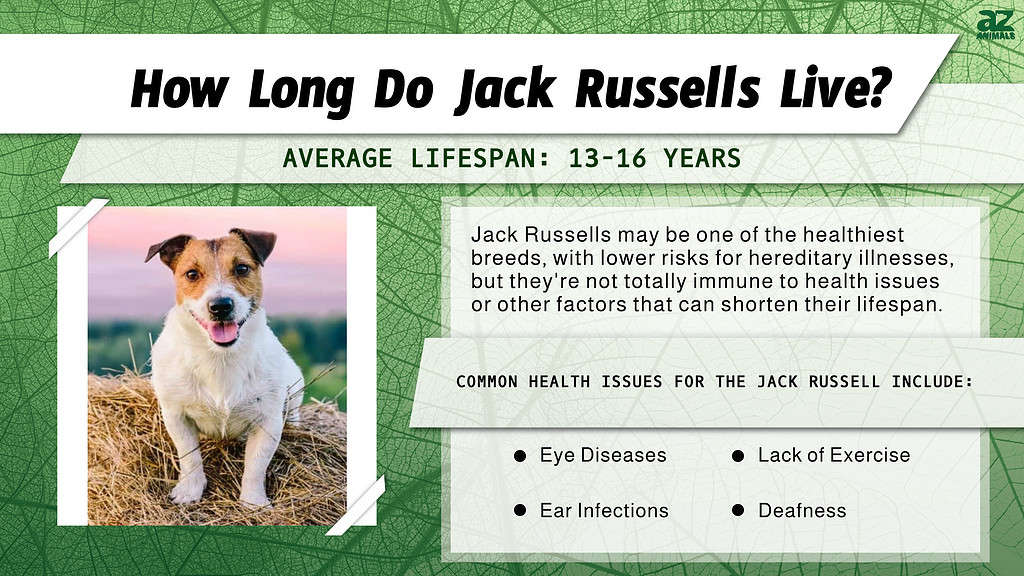
Jack Russell Terriers are small terrier dogs that originated in England as fox-hunting dogs. Despite their small size, these lively terriers are incredibly clever, full of energy, and love to be affectionate. They are the perfect companion for people who lead active lives and can provide their Jack Russell with tons of stimulation and fun activities to engage in.
The story of the Jack Russell is fascinating, as it all began with John Russell, an English clergyman. He enjoyed hunting foxes and always looked for a terrier to accompany him on his hunts. In 1819, he finally encountered the dog he was seeking, a British white terrier. Thus, the breed was born!
Want to learn more about this fun and lively pup? We’ve got all the facts on them, including the average Jack Russell lifespan and more!
How Long Do Jack Russells Live?

The Jack Russell Terrier has three coat types: smooth, broken, and rough, which is coarse, long straight hair.
©BIGANDT.COM/Shutterstock.com
The average lifespan for a Jack Russell is between 13-16 years. Jack Russell Terriers are among the healthiest and longest-living dog breeds. As a comparison, the average lifespan of a dog is usually 9-11 years.
Let’s compare the lifespan of other dog breeds similar to the Jack Russell, which include:
- Boston Terrier: Boston Terriers have an average lifespan of 11 to 15 years. They are more susceptible to various disorders that can shorten their life expectancy, resulting in some living just 10-11 years.
- Norfolk Terrier: Norfolk Terriers, which live an average of 13 to 15 years, are prone to minor health concerns such as allergies and significant illnesses such as canine hip dysplasia (CHD).
- Bull Terrier: Bull Terriers have an average lifespan of 10 to 14 years. They may suffer from patellar luxation and other minor health problems.
Compared to other dog breeds, especially other terriers, the Jack Russell is relatively free from any serious health complaints. Breeders have kept the gene pool true to its roots, avoiding direct in-line breeding. This is usually what is credited to the Jack Russell’s long lifespan.
According to Guinness World Records, Willie, the oldest Jack Russell, reached the age of 20 in 2014.
The Average Jack Russell Life Cycle
Many people adore the fierce but affectionate Jack Russell Terrier. Now that we better understand their lifespan, let’s learn more about their life cycle. Similar to other dog breeds, Jack Russells go through specific life stages.
Puppy
Jack Russells often give birth to 5 – 6 puppies in a litter. They can, however, give birth to up to 12 puppies at times. It is determined by the size, age, and health of the Jack Russell Terrier. The newborn puppies have a coarse coat, and their eyes and ears are tightly shut. As they grow, their eyes and ears open up, and these puppies will begin to enter their socialization stage. In 5 to 7 weeks, the puppies’ experiences and socialization with people and other dogs will significantly impact how they will interact in the future.
Adolescence
Adolescence begins at around five months. This is when their coat begins to grow in. Their personality will begin to show as well. They will be much more independent, and you may even notice disobedient behavior during this time. Since Jack Russells are full of energy, it’s important to begin training them around this stage to avoid behavioral issues later on. At around 8-9 months, they will reach sexual maturity, but they are still not adults yet!
Adulthood
Jack Russell Terriers are normally fully developed and considered adults by 12 months of age, so it’s doubtful that they’ll grow much (or at all) beyond this point. They will be happy to go on jogs and long walks with you. Keeping your Jack Russell healthy and happy involves giving them the stimulation they require.
Factors That Impact The Lifespan Of Jack Russells

The Jack Russell Terrier is about the size of a fox, standing 12 to 14 inches tall and weighing 13 to 17 pounds.
©iStock.com/alexei_tm
For dog owners interested in owning a Jack Russell, you’ll be happy to know that, as we mentioned above, they are one of the healthiest breeds. Jack Russells have a lower risk for hereditary or genetic illnesses. However, they’re not totally immune to any health issues or other factors that can shorten their lifespan.
Some of these factors include:
- Lack of physical exercise: Jack Russells require a lot of exercise and mental and physical engagement. They may develop behavioral issues if they do not get the opportunity to unleash all of their pent-up energy and challenge their intellect. The breed is at particular risk for weight gain which is why they need to stay active.
- Deafness and ear infections: Unfortunately, Jack Russell Terriers are highly susceptible to canine ear infections. Bacteria are the most common cause of canine ear infections. This can cause bigger health issues if left untreated.
- Eye problems: Few things have such a profound influence on your dog’s quality of life as good eye function. Unfortunately, Jack Russell Terriers can inherit or acquire a variety of eye diseases, some of which can lead to blindness if not treated promptly.
How To Extend The Life Of Your Pet Jack Russell

The Jack Russell can leap five times its height!
©Larina Marina/Shutterstock.com
Now, let’s talk about how we can extend the lives of our Jack Russell Terriers. We all want our beloved companions to have a longer life as dog owners.
Here are some of the greatest ways to extend your Jack Russell Terrier’s life:
- High-Quality Diet: It is critical that your Jack Russell consumes high-quality food. Cheap dog food should be avoided at all times since it is most likely composed of low-quality ingredients and delivers inadequate nutrition to your dog. Because it is prone to overeating, make sure it eats at least two meals every day.
- Keep Them Physically Engaged: Obesity can significantly lower your Jack Russell Terrier’s life expectancy since it raises the chance of various health disorders such as diabetes, heart disease, and breathing problems. Give it enough physical activity to maintain its weight.
- Play Interactive Games With Them: Jack Russells are exceptionally smart dogs. As a result, it’s critical to provide them with opportunities to use their mental energy. Engaging them in a scavenger hunt or other fun puzzle-solving games is a great way to do this.
The photo featured at the top of this post is © iStock.com/alexei_tm
Ready to discover the top 10 cutest dog breeds in the entire world?
How about the fastest dogs, the largest dogs and those that are -- quite frankly -- just the kindest dogs on the planet? Each day, AZ Animals sends out lists just like this to our thousands of email subscribers. And the best part? It's FREE. Join today by entering your email below.
Thank you for reading! Have some feedback for us? Contact the AZ Animals editorial team.






